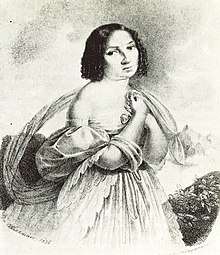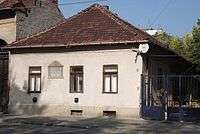Déryné Róza Széppataki
Déryné [Mrs. Déry] Róza Széppataki, born as Rozália Schenbach, commonly known as Déryné (23 December 1793, Jászberény - 29 September 1872, Miskolc) was the first acclaimed female opera singer of Hungary and the best known actress of early Hungarian theater.
Déryné Róza Széppataki | |
|---|---|
 | |
| Born | December 23, 1793 |
| Died | September 27, 1872 (aged 78) |
| Occupation | Actor |
| Years active | 1815 - 1847 |
Early life
Rozália Schenbach was born as the daughter of Josef Schenbach, an apothecary from Vienna settled in Jászberény, and Nina Riedl. Schenbach died five years later, and Róza's mother, left with two little girls, and six boys from his previous marriage found it increasingly hard to maintain their livelihood. As a woman, she was not allowed to run the apothecary alone, and the municipality sent often replaced overseers to help in the business, which resulted in poor management. One of them, Mr. Gruber told wonderful tales of Theatre in Budapest to the young girl, who started to dream about joining the world of actors, even if she had never seen a play before. As another tragedy, three of Rozália's half-brothers died during these years. Soon they had to sell the shop, and the 16-year-old Rozália followed her older half-brothers to the capital, who were already working there. She was taken care by an old friend of the family, Mr. Rothkrepf. He was the one who took the young girl to her first theatrical play, after which she desperately began to try to join the show, sneaking in the dressing rooms multiple times. When the widow Mrs. Schenbach learnt of this, she went personally to Pest to take her girl, "seduced by the corrupt morals of the city", back to Jászberény. Much debate and quarrel followed, after which the mother finally gave up. A letter came from a Hungarian troupé in Pest that asked the mother, if she agrees, to let the girl join them. A one-year-long contract was worked out, and Rozália joined the National Playing Company of Pest.
Career
Waiting behind the curtains for her first small role, the older actresses denied the play supervisor to let her on stage as she "looked and acted foolishly". Crying for days after this first disappointment, Rozália was taken in the care of Mrs. and Mr. Murányi, who introduced her to the basics of acting. One month after her first ill-fated play, she took her first role in a light-hearted comedy on 8 April 1810. Success slowly started to come. After the advice of director József Benke she translated her last name to Széppataki, and began to took role as actress, figurant and sang also in choirs.
As a remain of the Middle Ages, at the time in Pest theater and drama was looked down upon, and was usually pursued by Germans, in German; the Hungarian troupé had a hard time fighting traditions. Aided by the social shift of the Reform period of the early 19th century, opening the doors of city mansions and country chateaus was a slow process. The growing audience could only be kept by a fastly changing repertoire, requiring rigorous, hard work.
The young Rozália's fame grew with each season, granting her increasingly prestigious roles. In 1813 she married István Déry, but after he allegedly mistreated her, they shortly parted. Never officially divorced, Déryné (Mrs. Déry) became her pseudonym for the rest of her life.
Leaving Pest in 1815, she took the life of the strolling actor, joining a number of companies, notably the one of Dávid Kilényi. In the next decades she toured nearly every major city in the Hungarian parts of the Austro-Hungarian Monarchy, like Kassa (Košice), Brassó (Brașov), Pécs, Debrecen or Kolozsvár (Cluj-Napoca), and became the first widely known actress in the country. Her name alone drew large crowds, numerous paintings and poems were crafted for her. She was the target of the first critical articles in the press of the era.
In 1837, she returned to Pest to join the Pesti Magyar Színház (Hungarian Theatre of Pest) - which eventually became the National Theatre of Hungary - as a leading actress. In the great flood of 1838, which demolished large parts of the emerging city, Déryné's apartment was also hit. Stuck on an upper floor without much food or water in the cold, she was rescued only days later. The accident took a heavy toll: she lost her voice for months, during which she did not take part in the life of the theatre. This soured the relation with both the company and the audience - which resulted in increasingly critical voices after stepping on the stage again. Felt to be neglected and isolated, Déryné started to tour again, visiting stages from her golden days: Kassa, Kolozsvár, Debrecen, and smaller cities of Transylvania. As she could only retain a fraction of her former success, for the first time in her career, she asked for roles in the National Theatre. She felt increasingly hard to hide her fading voice, and critics started to accuse her to have an "outdated" acting style, compared to the more modern, realistic fashion symbolized by a new diva, Róza Laborfalvi. After a year, and a scarce number of appearances, she retired in 1847.
Later life

Having met her husband István Déry in 1838, Déryné now accepts the offer she then refused: to live with him in the countryside. Living in full retirement, they lived in Tarcal and Diósgyőr, with the actress refusing contact from journalists or former colleagues. After Déry's death in 1868, she moves to Miskolc to live with her sister, in great poverty. Accepting the request of her acting godson, Ákos Egressy, touring in Miskolc at the time, she takes a last role in 1868. Carried in arms to the stage, aged 75, she played an old nun, with witnesses describing her play as strong and vivid.
In the coming months, she met Emília Egervári, who was shocked to see her living conditions. Her brother, known playwright and journalist Ödön P. Egervári convinced the National Theatre to send immediate yearly aid to Déryné. Nothing else to give, as a thanking gift, the actress promises to write down the story of her life. Battling with worsening health, she writes the manuscript for 3 years in monumental length, posting it in a continuous flow of large packets to her mentor. The memoir, which was later published in three volumes running over 1000 pages, is still one of the most important source on the life of early Hungarian opera.
Déryné died on 29 September 1872, a few days after sending the latest packet of her manuscripts. Accompanied only by a few neighbors and friends, she was buried in the alms house cemetery of Miskolc.
Legacy
Déryné had a pioneering role in Hungarian theater and opera. Besides being the first universally acclaimed actress of the country, Déryné translated 12 German plays to Hungarian, and had leading role in the foundation of the first opera companies in the region.
She was ceremoniously re-buried in Budapest in 1921. Three movies were based on her life, Futótűz (1944), Déryné (1951) and Déryné, hol van? (1975). Her former home in Diósgyőr is now a museum dedicated to her work.
Sources
- - Déryné Róza Széppataki in the Hungarian Theatrical Lexicon (György, Székely. Magyar Színházművészeti Lexikon. Budapest: Akadémiai Kiadó, 1994. ISBN 9789630566353), freely available on mek.oszk.hu
- István, Karcsai Kulcsár. Így élt Déryné. Budapest:Móra Ferenc Könyvkiadó, 1978. ISBN 9789631112696
- László, Tóth. Budapest:Lilium Aurum, 1998. ISBN 9788080620028
External links
- Extensive biography on website szineszkonyvtar.hu (in Hungarian)